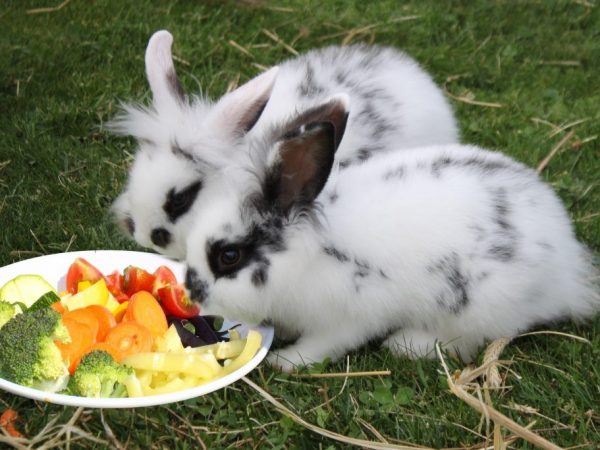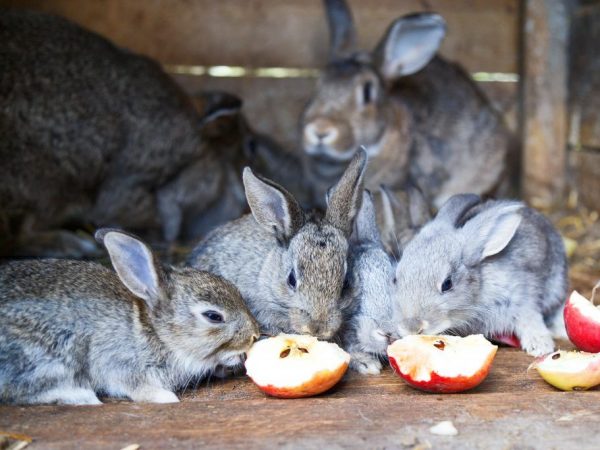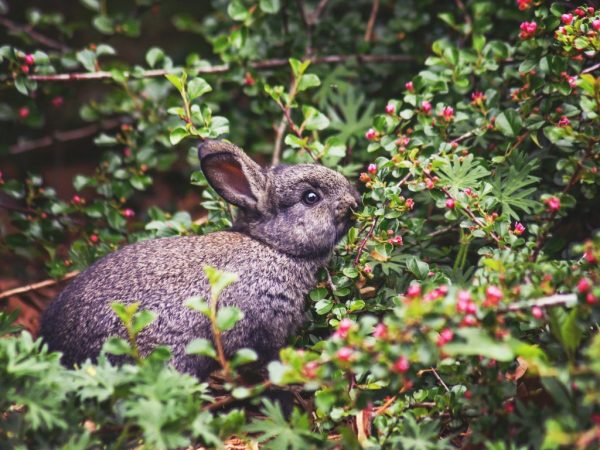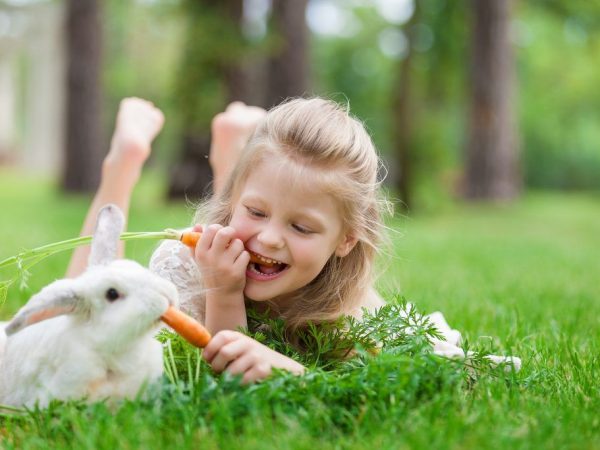What fruits and vegetables can you feed rabbits?
In order for the rabbit to be strong and healthy, it is necessary to diversify its menu. Experienced breeders use proven products available. What vegetables and fruits can you feed your rabbit? Let's analyze the common options that are relevant for domestic livestock farming.

Vegetables and fruits for the rabbit
Physiological features of a rabbit
Before embarking on gastronomic experiments, it is worth studying the anatomical subtleties of the species. The digestive tract of pets is very sensitive. For it to function properly, you need a balanced diet containing fiber, fruits and vegetables.
Rabbits eat in small portions and often. More than 70% of the menu consists of products based on plant fibers (hay, cereals). An excess of one or another element is undesirable in the diet.
If you choose the right types of fruits and berries for your pet, they will help improve immunity and appetite in rabbits, and also perfectly cleanse their intestines from wool and other debris.
Vegetables and fruits are not natural food for rabbits, therefore they are used as a treat. Supplements are given in small portions between the main menu and the herb. After each new product, the reaction of the digestive system is closely monitored. Diarrhea or bloating will be a signal for cancellation.
Eared are not pigs, so different types of crops cannot be mixed with the same feeding. On the same day with apples, do not give strawberries or zucchini. The assortment of juicy foods can cause an increase in the formation of gas, which negatively affects the general condition of the pet.
To make it easier for the animals to eat, it is recommended to chop vegetables and fruits. It is not necessary to use specialized mechanical devices, just cut into small pieces (up to 4 cm).
Apples
Apples are one of the most common crops in domestic farms, so farmers often use the fruits to feed the eared ones. A useful product is a good source of iron, which is responsible for the normal growth and development of animals. The juice remaining after squeezing out is perfectly absorbed and does not cause digestive problems.
Slices of apples are given to strengthen rabbit teeth. Due to the firm texture of the pulp, the oral cavity is cleared of food debris. This becomes the prevention of various diseases that occur during food rotting.
What fruits can you feed your pets? There are a number of important requirements for a delicacy.
- Ripe. Do not give green pads, which will provoke digestive problems. It is recommended to feed the fruits in late summer and autumn.
- Homemade. Store products are treated with special compounds, so they can be poisonous to the weak stomach of rabbits.
- Fresh. Never give missing, rotten or moldy specimens. All affected areas are carefully removed.

Apples for rabbits
Apples are introduced into the diet of the eared ones gradually, following the reaction of the body.For the first time, you can give a small piece, and then increase the allowable dose. Even the largest fruit is not a substitute for good nutrition. One copy of the dessert is enough for an adult or a whole group of young animals.
In what form can apples not be used? Dried fruits and those subject to heat treatment are prohibited. In fresh products, the middle is removed along with the toxic bones.
Pears
The sweet juicy fruits are very popular with rabbits. An excess of them in the diet causes increased gas production. Overeating will cause stomach upset. To avoid problems, fruits are given very rarely and a little: no more than 80 g per adult.
You can not feed store pears, which are treated with chemicals for keeping quality. Eared pets have a weak digestive system that reacts sharply to any harmful element. If it is not possible to use home copies, then it is better to refuse the product.
Often animals do not want to eat a juicy dessert due to special taste preferences. You should not experiment and force the beast to eat an unloved product. This is a delicacy, and it must be pleasant.
How are pears given to rabbits? Before feeding, the middle and poisonous bones are always removed. The fruit is cut into small slices and offered to the eared ones. Pears must not be mixed with other fruits and hay.
Berries
In summer and autumn, watermelon and melon are available. The delicate fibers have a mild debilitating effect, which helps with constipation in animals. Before feeding, the products are thoroughly washed, cut, seeds are removed from them. The peels are removed from the peel, chopped into small pieces.

Feeding rabbits with berries
Vineyard owners indulge their pets with berries and cut leaves throughout the season. Professionals advise using seedless varieties. In addition, the animals can:
- raspberries;
- strawberries;
- gooseberry;
- sea buckthorn;
- rosehip;
- currants.
When shouldn't you give juicy berries? Lost fermented foods are contraindicated for rabbits. It is also dangerous to feed the animals before the official melon season begins. Fruits for pregnant females are prohibited. The aroma of food attracts wasps and bees, which is undesirable for animals living in the open air.
Exotic species
Of citrus fruits, it is better to include mandarin slices in the pet's diet: they have a more delicate taste, so the juice will not irritate the sensitive digestive system of rabbits. The recommended rate for one individual is no more than a piece within 72 hours.
Some breeders indulge the animals with exotic fruits. If possible, it is allowed to give kiwi and pineapples in limited quantities. Care should be taken with starchy foods: they cause obesity. Banana skins are treated with chemicals, so don't feed them.
Each type is given separately, in small portions. At the same time, be sure to monitor the external manifestations of food rejection in a pet: the digestive system quickly reacts to an unsuitable element. Never produce missing, moldy or frozen fruit.
Roots
Like banana, nutritious plants are low in fiber and high in digestible carbohydrates. This combination allows you to keep the stomach in excellent condition, increase lactation in rabbits and the quality of semen in breeders. Experienced farmers prefer to feed the animals with this type of food.
Potatoes contain a lot of starch. On such a diet, animals quickly gain weight and get fat, so do not get carried away. Boil before use. The scions and greenish peels of the root crop are highly toxic and forbidden by the eared.
Can a rabbit have carrots? In winter, it is the main source of vitamin A. It is fed whole or cut into 3 cm cubes. Rabbits can be given a finely grated vegetable. The skin is removed from the culture, dark or green areas are removed.

Can a rabbit have a carrot
If you need a useful root vegetable to normalize metabolism and blood composition, then it is better to turn to the proven option. Fodder and sugar beets are used both fresh and ensiled. The red variety is excluded from the menu due to possible digestive problems.
In addition to the above vegetables, it is allowed to feed turnips, Jerusalem artichoke and rutabaga. Root vegetables are cut into pieces, chopped or boiled for mash. Due to the possibility of gas formation, radishes are used in limited quantities.
Cereals and legumes
Not all grains are good for rabbits, and some varieties can do harm. You cannot feed rye, rice, millet and millet: these crops contain substances that increase the amount of mucus in the stomach. They have very little fiber and some varieties are very hard.
When growing eared beans, it is not recommended to use red beans and young pea pods. Plants cause excessive gas production, which leads to bloating. Pets have a very weak digestive system, so don't experiment.
Do not supplement porridge with rye or make mashed peas. This type of food is very heavy. The components are poorly broken down in the stomach and are not always beneficial. A dry product is also prohibited.
Other types of vegetables
What else can be used in animal husbandry? Zucchini contains a lot of moisture, so they are ideal for silage to the tops. Only the feed variety of the product is used.
Green salad must be washed and dried before serving. It contains many trace elements and vitamins: it has a positive effect on the immunity of animals and stimulates the appetite. The product is introduced gradually, observing the reaction of the livestock.
Experienced farmers advise against using cucumbers and tomatoes for rabbits. Eggplants contain a lot of bitterness, so they are also not acceptable for pets. Better to give preference to dairy and boiled corn.
Onions are an undesirable plant for animals. During the period of vitamin deficiency, adults are given the greens of the culture. Sweet bell peppers are not always to your taste, so you should not force feed them to your pet.
By the way, pumpkin is a cheap domestic analogue of a banana. Both feed and gourmet varieties can be used. The sweet nuggets contain a lot of healthy fibers that have a positive effect on the digestive system. They can be boiled or used raw.
Do not give cabbage to animals. The vegetable contains a large number of substances that cause bloating. A green leaf is always boiled or scalded with boiling water before a meal. A fresh plant is undesirable.
Remains of cultures
Can rabbits be fed with tops? Many have heard that raw materials are used as the basis for silage, so they try to use everything. However, not all cultures are equally beneficial for the eared.
Do not feed pets with the tops of nightshade plants. Tomato and eggplant tops, as well as sprigs of pepper, potatoes are forbidden to use in any form: they concentrate a dangerous poisonous substance that can kill not only a weak rabbit, but also an adult.
Sunflower cake is an excellent source of vitamin E, therefore it has long been used in animal husbandry. The plant is high in fat and can cause obesity. To avoid problems, you need to accurately calculate how much product you need per head.
Green pea husks can be added to adult menus. It is given along with hay in winter, supplementing the poor seasonal diet. To create silage, the remains of beet leaves are often used. Radishes (greens) are mowed, dried and fed to pets. Do not get carried away with dried sunflower residues.
Prohibited foods
The mass death of livestock is the result of carelessness and careless experiments of the farmer. To avoid mistakes, you need to know the enemy by sight.What should not be in the diet?
Red cabbage is a prohibited food. It violates the microflora of the stomach, causing irreversible consequences. If species with a white leaf can be boiled or scalded with boiling water, then this vegetable retains its properties for a long time.
As with tomato tops, potato tops should not be given. For rabbits and adults, green "fruits" and young tubers remain poisonous. The product is dangerous both raw and boiled.
Celery should not be given without additives. Diluted with lettuce and other vegetables, it will do more good and not harm. Dill and parsley are included in the diet of lactating females, the rest of the individuals do not need it.
Seeds and pits should not go into the feeder. Do not feed with rhubarb and fresh garlic. Do not get carried away with exotic crops such as banana or mango.
Not all plants are equally beneficial for the eared herd. Knowing which fruits and vegetables you can and cannot eat can easily avoid many problems. Our recommendations will help you understand the correct keeping of rabbits.


